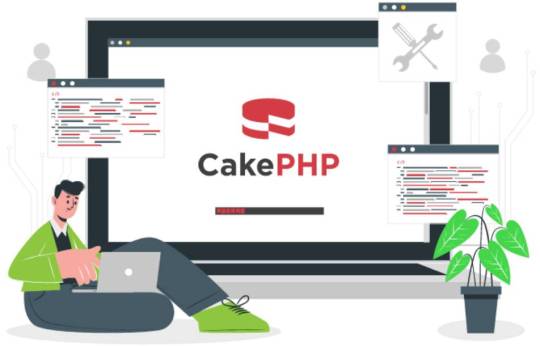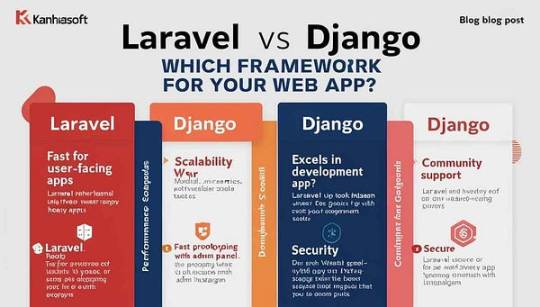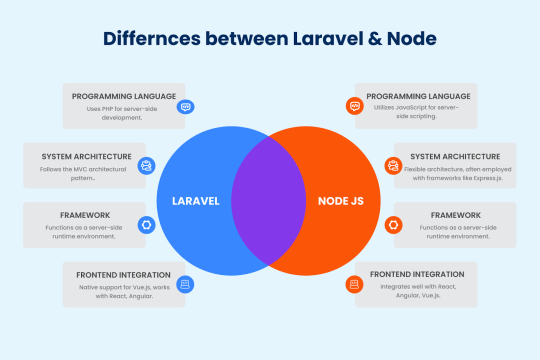#Custom Laravel Web Development
Explore tagged Tumblr posts
Text

Mastering Custom Laravel Web Development
Embark on a journey of digital mastery with 'Mastering Custom Laravel Web Development.' This comprehensive guide delves into the intricate world of Laravel, empowering developers to craft bespoke web solutions with precision and finesse. Unleash the full potential of Laravel's powerful framework as you learn advanced techniques, best practices, and customization strategies. From dynamic website development to tailored user experiences, this resource equips you with the skills to create digital marvels. Elevate your web development expertise, unravel the complexities of Laravel, and become a maestro in crafting unique and sophisticated online platforms. 'Mastering Custom Laravel Web Development' is your key to unlocking limitless possibilities in the realm of bespoke web solutions.
0 notes
Text
CAKE PHP DEVELOPMENT

What is CakePHP?
CakePHP is an open-source web framework written in PHP scripting language for web development based on the core PHP framework and MVC architecture. MVC architecture mostly Centre on model, view, and controller of the specific project to give logical separation of code from the end user.
CakePHP was created by Michal Tatarynowicz in April Year 2005. The framework gives a strong base for your application. It can hold each aspect, from the user’s beginning request all the way to the final supply of a web page.
And since the framework follows the fundamental of MVC, it permits you to simply customize and expand most aspects of your application.
The CakePHP also gives a simple organizational structure, from filenames to database table names, keeping your whole application constant and logical. This concept is easy but impressive. Go around with the protocol and you’ll always know absolutely where things are and how they’re arranged.
Here’s a quick list of CakePHP features such as:
It follows MVC architecture
Rapid development
Application scaffolding
Active, friendly community
Built-in validations
Secure, scalable, and stable
Flexible licensing
Localization

Why select CakePHP for website development:
1. Compatible : The Cakephp is compatible with several versions of PHP as well as with the in demand website directories.
2. Customizable Elements : The Elements residing inside the framework are simple to redesign and understand.
3. No Download Required : There is no requiring downloading the whole package as you can get started by directly installing the database.
4. Code Reusability : Coding from scratch isn’t needed as code-written can be used so many times in the project decrease time and effort.
5. MVC Pattern : Huge apps need a structured pattern to get started, which CakePHP offers with its special MVC pattern.
6. Code Simplicity : Easy code written in PHP can do the trick for you. The framework is simple, successful and high on areas like security and session handling.
“Make use of CakePHP means your core application’s is well checked and is being always improved.”
At Kudosta, Website Design and Development Company we provide CakePHP web services such as Framework Customization, CakePHP Module Development, CakePHP Migration and lots more. Try to deliver the best of CakePHP web services in the market.
We have worked for several big scale as well as medium scale enterprises. Our team of skilled CakePHP programmers work with passion, practice new techniques offers you the best depending on your project’s needs.
#php development#ecommerce web design#custom web design#wordpress website#custom web development#seo services#wordpress development#web design#web development#custom web#laravel#react#nodejs#cakephp
4 notes
·
View notes
Text
NodePrix is a leading software development company offering top-notch services in web development, mobile app development, custom software solutions, and digital marketing. With expertise in technologies like Node.js, Python, React, and WordPress, we deliver innovative, scalable, and secure solutions to help businesses succeed globally. Partner with us for tailored digital growth!
#web design & development company#professional app development company#web development company in india#Laravel Development Services#Python development services#wordpress development services#reactjs development services#Flutter App Development Company#app development company#ui ux design development services#ui ux design company#custom software development services#best SEO company in india
0 notes
Text
What is Web Development Framework?
Choosing the right Web Development Framework can make or break your website’s success. Whether you're building a personal site or a full-scale application, frameworks like React, Django, Laravel, and Next.js offer speed, security, and scalability. 🎯 From front-end to back-end, frameworks help streamline code, boost performance, and ensure consistent results. Plus, for design lovers, frameworks like Tailwind CSS and Bootstrap make styling a breeze.
Why It Matters:
Saves time with built-in features
Offers scalable solutions
Improves SEO and user experience
Ideal for beginners and pros alike
👉 Ample Websol, Vadodara’s top web development company, helps you choose the perfect stack for your business goals.
📞 Need help choosing the right tech for your website? Contact us now!
🔗 To Read the Full Article, Click the Link Below https://amplewebsol.com/what-is-web-development-framework/
#ample websol#digital marketing#website development#seo company#Website Design#custom website design#web design#laravel#nextjs#nodejs#vuejs
0 notes
Text
Ultimate Guide to Choosing Between Laravel and Django for Your Next Web App

Building a web application is no small feat. It’s like assembling a spaceship — every component matters, and choosing the wrong framework can send your project into a black hole. At Kanhasoft, we’ve spent years crafting custom software solutions that feel like a secret superpower for our clients. Two of our favorite tools? Laravel and Django, the rockstars of web development frameworks. But which one is the best framework for your web app? Spoiler: there’s no one-size-fits-all answer, but we’re here to break it down so you can make an informed choice.
Whether you’re a startup dreaming of the next big app or an enterprise streamlining operations, this guide will compare Laravel vs Django across performance, scalability, security, and more. Let’s dive into the nitty-gritty and help you pick the perfect framework for your next project.
Why Laravel and Django? The Heavyweights of Web Development
Laravel (PHP-based) and Django (Python-based) are battle-tested frameworks loved by developers and businesses alike. Both power robust, scalable web apps, but they cater to slightly different needs. At Kanhasoft, a software development company with expertise in both, we’ve built everything from eCommerce platforms to data-heavy enterprise systems using these tools. So, why are they so popular?
Laravel: Known for its elegant syntax and rapid development, Laravel is a PHP framework that makes building feature-rich apps a breeze. It’s packed with tools like Eloquent ORM, Blade templating, and built-in authentication.
Django: The Python-powered Django is all about “batteries included,” offering a full-stack ecosystem with ORM, admin panels, and security features out of the box. It’s a favorite for data-driven and rapid-prototyping projects.
Performance: Speed That Keeps Up with Your Ambition
When it comes to performance, both Laravel and Django deliver, but their strengths differ. Laravel, built on PHP, shines in environments with high user traffic, like eCommerce platforms. Its caching tools (e.g., Redis, Memcached) and optimization features ensure snappy response times. At Kanhasoft, we’ve used Laravel to build custom software for marketplaces that handle thousands of transactions daily without breaking a sweat.
Django, on the other hand, leverages Python’s efficiency and excels in CPU-intensive tasks, like data processing or machine learning integrations. Its asynchronous capabilities (introduced in Django 3.1) make it a strong contender for real-time apps. For example, we’ve powered Django web development projects with complex analytics dashboards that crunch numbers in milliseconds.
Verdict: Choose Laravel for user-facing apps with heavy traffic. Go with Django for data-heavy or computation-intensive projects. Need both? A software development company like Kanhasoft can blend their strengths with microservices.
Scalability: Growing Without the Growing Pains
Scalability is where your web app proves it can handle success. Laravel’s modular structure and support for microservices make it a go-to for apps that need to scale horizontally. Think of platforms like Airbnb or Uber — Laravel’s ecosystem (with tools like Laravel Vapor) can support massive user bases. We’ve built scalable Laravel apps at Kanhasoft that seamlessly grew from MVP to enterprise-grade solutions.
Django’s scalability is equally impressive, thanks to its clean architecture and Python’s versatility. Companies like Instagram and Pinterest run on Django, proving it can handle billions of requests. Django’s ability to integrate with cloud platforms (e.g., AWS, Google Cloud) makes it ideal for startups planning to scale fast. Our custom software projects often use Django for rapid prototyping that evolves into robust systems.
Verdict: Both frameworks scale well, but Laravel is better for modular, user-centric apps, while Django suits data-driven, cloud-native systems. Let’s explore another critical factor: development speed.
Development Speed: From Vision to Victory
Time-to-market is a make-or-break factor for startups and enterprises alike. Laravel’s developer-friendly features — like pre-built authentication, routing, and Artisan CLI — accelerate development. Its vibrant community and packages (via Composer) mean you’re never starting from scratch. At Kanhasoft, we’ve used Laravel to deliver custom software in record time, empowering clients to launch ahead of competitors.
Django’s “batteries included” philosophy gives it an edge for rapid prototyping. Its built-in admin panel, form handling, and ORM let developers focus on business logic rather than boilerplate code. For Django web development, we’ve built MVPs in weeks, complete with admin dashboards that clients love tweaking themselves.
Verdict: Laravel is faster for feature-rich apps with complex frontends. Django wins for quick prototypes and data-heavy backends. Your timeline and team’s expertise will tip the scales.
Security: Keeping Your App Fortified
In today’s world, a single security breach can sink your app’s reputation. Laravel and Django both prioritize security, but their approaches differ. Laravel offers built-in protections like CSRF tokens, XSS prevention, and secure authentication. Its regular updates and active community keep vulnerabilities at bay. We’ve used Laravel to build secure eCommerce platforms that handle sensitive payment data with ease.
Django is a security powerhouse, with features like SQL injection prevention, CSRF protection, and automatic escaping of HTML. Its “secure by default” mindset makes it a favorite for industries like healthcare and finance. At Kanhasoft, our Django web development projects often include custom security layers for enterprise clients.
Verdict: Both are secure, but Django’s out-of-the-box protections make it slightly easier for beginners to avoid pitfalls. Laravel’s flexibility suits teams with strong security expertise.
Community and Ecosystem: Support That Powers Progress
A framework’s community can be your lifeline during development. Laravel’s ecosystem is massive, with thousands of packages on Packagist and a thriving community on forums like Laracasts. Need a payment gateway or API integration? Laravel’s got you covered. Our team at Kanhasoft leans on Laravel’s ecosystem to deliver custom software tailored to unique client needs.
Django’s community, while smaller, is equally passionate. Python’s vast ecosystem (e.g., libraries like NumPy, Pandas) makes Django a powerhouse for AI and data-driven apps. The Django REST Framework is a game-changer for API development, and we’ve used it to build seamless integrations for clients.
Verdict: Laravel’s ecosystem is broader for web app features, while Django’s Python roots give it an edge for AI and analytics. Choose based on your app’s niche requirements.
Kanhasoft’s Take: Making Technology Your Superpower
At Kanhasoft, we believe technology should feel like a secret superpower. Whether you choose Laravel or Django, our software development company can turn your vision into reality. Laravel’s elegance powers our eCommerce and marketplace projects, while Django’s versatility drives our AI and ERP solutions. Can’t decide? We’ve even combined both in microservices architectures for clients who want the best of both worlds.
Here’s the thing: the best framework for your web app depends on your goals. If you’re building a user-facing platform with complex features, Laravel’s speed and flexibility are hard to beat. If your app leans on data processing, AI, or rapid prototyping, Django’s ecosystem is your ally. Either way, partnering with a software development company like Kanhasoft ensures your app is built to succeed.
FAQs About Laravel vs Django
Q1: Which is better for startups, Laravel or Django? A: Laravel is ideal for startups needing feature-rich apps with quick market entry, thanks to its rapid development tools. Django suits startups focused on data-driven MVPs or AI integrations, offering fast prototyping and scalability.
Q2: Is Django more secure than Laravel? A: Both are secure, but Django’s “secure by default” features (e.g., automatic SQL injection prevention) make it slightly easier for beginners. Laravel offers robust security with proper configuration, ideal for experienced teams.
Q3: Can Laravel and Django be used together? A: Yes, in a microservices architecture. For example, Kanhasoft has built apps using Laravel for the frontend and Django for data-heavy backends, ensuring the best of both worlds.
Q4: Which framework is faster for web app development? A: Laravel accelerates development for complex, user-facing apps with tools like Artisan. Django is faster for prototypes and data-driven apps due to its built-in admin and ORM.
Q5: How do I choose the best framework for my web app? A: Consider your project’s goals, team expertise, and timeline. Laravel suits eCommerce or modular apps; Django excels in analytics or AI-driven projects. Consult a software development company like Kanhasoft for tailored advice.
Conclusion: Your Web App, Your Superpower
Choosing between Laravel and Django isn’t about picking a winner — it’s about finding the framework that makes your web app a powerhouse. At Kanhasoft, we’ve seen both frameworks transform ideas into reality, from sleek marketplaces to intelligent ERP systems. As a software development company, our mission is to make technology feel effortless, like a superpower you wield with confidence.
So, what’s your next step? Evaluate your project’s needs, weigh the strengths of Laravel vs Django, and let your vision guide you. Better yet, reach out to Kanhasoft for a free consultation. We’ll help you choose the best framework for your web app and build custom software that sets you apart. Let’s make your app the hero of your story — contact us today!
0 notes
Text
Looking for a top Laravel development company in the USA? iQlance offers expert Laravel development services, delivering scalable, secure, and high-performance web solutions.
#Laravel Development Company#Laravel Development Services#Custom Laravel Solutions#Laravel Web Development
1 note
·
View note
Text
Are you in doubt about choosing the right #PHPframework for your #customwebapp? Yes, then must explore this guide and ease of use to make an informed decision.
1 note
·
View note
Text
Unlock Digital Potential with Custom Laravel Web Development
Are you seeking a tailored web solution that aligns perfectly with your business needs? Our Custom Laravel Web Development services are your gateway to a seamless and robust online presence. Harness the power of Laravel, the PHP framework known for its elegance and efficiency. Our experienced developers craft bespoke web applications, ensuring scalability, security, and optimal performance. Elevate your digital experience with cutting-edge technology. Contact us for a consultation and let your web presence stand out in the competitive online landscape. Your vision, our expertise – unlocking limitless possibilities in the world of web development.
0 notes
Text
Best Practices For Securing SaaS Applications With Workflow Apps.
Read Full Blog Hear,
Visit Website, Glasier Inc.
Our Blogs
Other Services,
hospital management system
erp software development company
Hire Angular Developers
Hire SaaS developer
Hire Flutter Developers
Hire ReactJs Developers
#hire SaaS developers#Hire SaaS developer#hire dedicated developers#custom software develpment#hire angular developers#best seo agency in india#app development#app development cost#advertising#website#offshore developers#web development#ios application development services#laravel development services#app developing company
2 notes
·
View notes
Text
Laravel Development Company in Australia
LDS Engineers is a top Laravel Development Company in Australia, acknowledged for delivering terrific Laravel net development offerings internationally. Whether you want a custom Laravel answer, an internet site template, or professional Laravel builders, we offer the entirety to build powerful net applications. We specialize in developing speedy, steady, and scalable net programs with the usage…

View On WordPress
#Custom Laravel Solutions#Expert Laravel Developers.#Laravel Development Company#Laravel development solutions#Laravel services#Laravel tutorial#Laravel web development#Laravel web development services#Laravel Website Template#PHP Laravel developer
0 notes
Text
Unlocking the Potential of Laravel App Development
Laravel app development has become a game-changer for businesses seeking fast, secure, and scalable web applications.
#Laravel App Development#web development#custom web design company#shopify developer#woocommerce development services#wordpress development
0 notes
Text

A Laravel web development company delivers scalable, secure, SEO-friendly websites with seamless user experiences, robust integrations, and cost-effective development.
#Hire Laravel developers#Hire Dedicated Laravel Developers#Hire Laravel Programmers#Hire Offshore Laravel Developers#Hire Remote Laravel Developers#Hire Laravel consultant#Hire Laravel Experts#Laravel Web Development Company#Custom Laravel Web Development Services#Laravel development services#Hire Laravel specialist
0 notes
Text
Custom Laravel Development Services by Shiv Technolabs
Shiv Technolabs offers custom Laravel development services, focusing on building secure, scalable web applications. Our team specializes in creating tailor-made solutions, developing RESTful APIs, and integrating third-party services.
We emphasize clean code, robust authentication, and efficient database management. With our expertise, businesses receive highly functional Laravel solutions that meet their specific needs, ensuring performance and reliability across all platforms.
0 notes
Text
Why Flutter is Revolutionizing Cross-Platform Mobile App Development

In recent years, cross-platform mobile app development has gained significant traction. Businesses want apps that run smoothly on Android and iOS without developing separate codebases for each. This is where Flutter, Google’s open-source UI framework, comes into play. Since its launch, Flutter has been reshaping the mobile app development landscape by making it easier, faster, and more efficient to build cross-platform apps.
In this blog, we’ll explore why Flutter is becoming the go-to choice for developers and businesses alike, how it’s revolutionizing mobile app development, and what benefits it brings to the table.
1. What is Flutter?
Flutter is an open-source UI software development kit (SDK) created by Google. It enables developers to build natively compiled applications for mobile (Android & iOS), desktop, and web from a single codebase. Unlike traditional frameworks, where different code is written for different platforms, Flutter allows a write-once, run-anywhere approach.
Key Features of Flutter:
Single Codebase: Develop once, and the app can be deployed across multiple platforms.
Hot Reload: Instantly see changes in the code without restarting the app.
Pre-built Widgets: A rich set of customizable widgets that provide pixel-perfect app designs.
Strong Community Support: Backed by Google and a large developer community.
2. Why Choose Flutter for Cross-Platform App Development?
The reasons why Flutter stands out among other cross-platform frameworks like React Native or Xamarin are its speed, flexibility, and modern architecture. Let’s look at the key reasons why developers and companies are increasingly choosing Flutter:
A. Single Codebase for Multiple Platforms
One of the biggest advantages of Flutter is that developers can write one codebase and deploy it across Android, iOS, web, and desktop. This significantly reduces development time and cost for businesses.
Example: A startup developing a social media app doesn’t need to hire separate teams for Android and iOS development. With Flutter, one team can develop and maintain both versions, speeding up time-to-market and reducing expenses. For instance, the company Reflectly, which is an AI-driven journal app, successfully launched its app on both platforms using a single codebase, allowing it to focus on features rather than platform-specific adjustments.
B. High-Performance Apps
Flutter apps are known for their high performance because they are natively compiled. The framework uses the Dart programming language, which compiles native ARM machine code, ensuring fast execution and quick app load times.
Core Example: Google Ads, the official app for managing Google Ads campaigns, was built using Flutter. This app showcases how Flutter can handle real-time data and provide high performance with a smooth user experience.
C. Hot Reload Feature
The Hot Reload feature of Flutter allows developers to see changes made in the code instantly. This boosts productivity by allowing quick iterations, debugging, and testing, thus minimizing delays in the development process.
Example: Developers working on the BMW app used Hot Reload to experiment with UI changes without losing their app state. This feature helped them refine their design in real time, resulting in a polished final product.
3. How Flutter Compares to Other Frameworks
A. Flutter vs. React Native
React Native is another popular cross-platform framework, but Flutter has an edge due to its richer set of pre-built widgets and its Skia graphics engine, which allows for faster rendering and smoother animations.FeatureFlutterReact NativeProgramming LanguageDartJavaScriptRenderingSkia EngineNative ComponentsHot ReloadYesYesPerformanceHighMedium
B. Flutter vs. Native Development
Native development for Android (using Java or Kotlin) and iOS (using Swift or Objective-C) results in platform-specific apps. While this allows for full access to platform-specific APIs and hardware features, it increases the development time and cost. Flutter strikes the balance by providing near-native performance with a single codebase.
Example: Alibaba used Flutter to develop parts of their app because it provided better performance while maintaining consistency across platforms. This allowed them to quickly iterate on features while ensuring a unified user experience.
4. Key Benefits of Using Flutter
A. Customizable Widgets
Flutter provides a large library of widgets that are highly customizable. These widgets help developers create pixel-perfect designs that look native on both Android and iOS. The flexibility of these widgets allows for faster UI creation and reduces the dependency on platform-specific designs.
B. Faster Development Cycles
Thanks to the single codebase and the Hot Reload feature, developers can iterate quickly, speeding up development cycles. This allows for faster time-to-market, which is a significant advantage for businesses looking to launch apps rapidly.
Core Example: eBay Motors utilized Flutter to develop its app, allowing for quicker iterations and faster release cycles. Their ability to quickly adjust features based on user feedback led to increased user satisfaction and engagement.
C. Cost-Effective Development
Building a separate app for iOS and Android can be expensive. Flutter significantly reduces the overall cost as developers only need to write and maintain one codebase. This is especially helpful for startups and businesses with limited budgets.
D. Strong Community and Support
Flutter has gained massive support from the developer community and Google itself. There are numerous tutorials, forums, plugins, and packages available, ensuring developers have access to all the resources they need.
5. Popular Apps Built with Flutter
Several high-profile companies have embraced Flutter for their app development. Here are a few examples:
Google Ads: The official app for managing Google Ads campaigns was built with Flutter, demonstrating its capability to handle complex functionalities and real-time data.
Alibaba: Parts of their mobile app were built using Flutter, showcasing its scalability and performance in high-traffic environments.
BMW: BMW’s app is powered by Flutter, offering a seamless cross-platform experience and demonstrating the framework’s capabilities in a high-end automotive environment.
6. Is Flutter the Future of Cross-Platform Development?
Flutter has made significant strides in the mobile app development world. Its ability to create high-performance, visually appealing apps from a single codebase has made it a favorite among developers.
Looking at its current trajectory, it’s clear that Flutter is set to dominate the cross-platform space. As more businesses seek to reduce development costs while delivering high-quality apps, Flutter’s role in revolutionizing mobile app development will only grow.
Conclusion
Flutter is indeed revolutionizing the way developers approach cross-platform mobile app development. By offering a single codebase, faster development cycles, cost-effective solutions, and high performance, Flutter is the ideal choice for businesses that need scalable and efficient mobile applications.
Looking to develop your next app using Flutter? Visit QalbIT Infotech PVT LTD for expert assistance in Flutter development!
#web development#ui ux design#web design#e commerce#digita marketing#businessgrowth#laravel#phpdevelopment#seo services#software development#flutter dandys world#fluttercord#flutter app development#mobile app company#mobile#app development#application#customer#software#github#mobile app development
0 notes
Text
Node.js Vs Laravel: Choosing the Right Web Framework
Difference Between Laravel And Node.Js

Differences Between Laravel & Node
Language
Node.js: Utilizes JavaScript, a versatile, high-level language that can be used for both client-side and server-side development. This makes the development easy. Laravel: Uses PHP, a server-side scripting language specifically designed for web development. PHP has a rich history and is widely used in traditional web applications.
Architecture
Node.js: It does not enforce a specific architecture, allowing flexibility. Middleware architecture is generally used. Laravel: Adheres to the MVC (Model-View-Controller) architecture, which promotes clear separation of demands and goals, which enhances maintainability and scalability.
Framework
Node.js: Acts as a runtime environment, enabling JavaScript to be executed on the server-side. It is commonly used with frameworks like Express.js. Laravel: A full-featured server-side framework that provides a robust structure and built-in tools for web development, including routing, authentication, and ORM (Object-Relational Mapping).
Strengths
Node.js: Node.js is lightweight and high-performance, using an efficient model to handle many tasks simultaneously, making it ideal for real-time apps and high user concurrency. Additionally, it allows developers to use JavaScript for both frontend and backend, streamlining the development process. Laravel: Laravel provides comprehensive built-in features, including Eloquent ORM, Blade templating, and powerful CLI tools to simplify tasks. It also emphasizes elegant syntax, making the codebase easy to read and maintain.
ReadMore
#werbooz#mobile application development#webdevelopement#custom web development#website design services#Node js Laravel#Node Js vs Laravel
1 note
·
View note